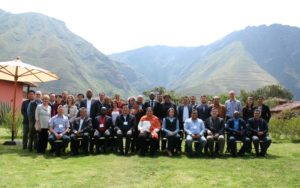MegaFlorestais celebrates a decade of convening global forest leaders to find innovative solutions to global challenges
Rapid changes in the world’s climate and rising pressures on its natural resources have pushed its forests into a constant state of flux. For this reason, many leaders of public forest agencies across the world have come to realize that their agencies were designed for simpler times, and need radical changes to adapt to this new era for forest governance.
Ten years ago in 2005, leaders of public forest agencies from the world’s most forested countries came together to address these changes and their implications for forest governance. The idea to create the group originated in a meeting in Beijing in September 2005 when the Rights and Resources Initiative (RRI) co-organized a conference on public forest reform with the Chinese Center for Agriculture Policy. Participating leaders from Brazil, China, the USA, and Mexico agreed to continue the collaboration borne from this event.
They became MegaFlorestais, an informal network of public forest agency leaders that advances dialogue and lesson-sharing on transitions in forest governance, forest industry, and the new roles for public forest agencies. Since 2005, forest leaders have been taking part in a series of remarkable meetings in countries across the globe. Current members include Russia, Brazil, Canada, the USA, China, DR Congo, India, Indonesia, Peru, Mexico, Sweden, and Cameroon, who altogether represent over 65 percent of the world’s forests. Additional countries have also taken part in activities of the MegaFlorestais network. These include Guatemala, Colombia, South Korea, Lao PDR, Liberia, Mali, and Senegal, among others.

At the tenth MegaFlorestais Meeting in 2015, Peru
The latest gathering – April 13-17, 2015 in Madre de Dios and Cuzco, Peru – marks the 10th anniversary of this unique convening. It will be an occasion to celebrate the singular role MegaFlorestais has played all these years in promoting more equitable and sustainable forest management practices in ministries across the world.
The most extraordinary aspect of MegaFlorestais is that it provides an unprecedented opportunity for forestry agency leaders from the world’s largest forested countries to speak openly and freely about their experiences and challenges. While many agency heads can convene in formal venues, few opportunities exist for top policymakers to interact candidly. Because of this “safe and open space,” these agencies have strengthened their relationships and abilities to tackle forest governance and sustainable forestry issues.
MegaFlorestais gatherings take a markedly forward-thinking approach toward forest governance. They recognize that the future for forests is fraught with changes and challenges. Continued deforestation, climate change, fires, pests, droughts, and a range of climate-related disasters are all expected to rise in the coming decades. Greater large-scale agricultural and extractive projects will continue to lead to infrastructure growth that will further destroy the remaining natural forests. In addition, national and global markets for forest products have also changed vastly; the rising demand for wood as energy being a case in point. There is also a rapid shift towards plantations as the leading source of commercial fiber.
With growing demand for food and energy security, many countries also face newer challenges in reallocating forest land toward agriculture and energy production.
But every time such a reallocation happens, it affects the peoples who live in and depend upon forests. These communities, who are among 80 percent of the world’s poorest people, have begun demanding more information and a greater role in making decisions that impact their lives, and rightfully so. Without their participation, the future of forests is incomplete, and any path to development unsustainable. MegaFlorestais meetings are an opportunity for members to understand the importance of this participation. To this end, the meetings include study tours and field trips to allow members to study examples of local community forestry and management of forest resources.
Since its inception, MegaFlorestais has provided an effective forum for discussing responses to these and other sensitive issues associated with institutional reform. Not only do all these responses require courage and humility, they must also recognize that getting it right in local forests is a global, not just local concern. And as David Nanang of the Canadian Forest Service says, “If we are interested in actually dealing with global issues, we (need) global networks.”
As MegaFlorestais completes its 10th year this year, it will continue to lead this critical global effort on formulating innovative solutions to preserve the world’s forests, and to advance their management in ways that support local development, rights and access to forest resources.
Read more about the 10th meeting held in Peru.
Watch a video commemorating the 10th anniversary of MegaFlorestais.
